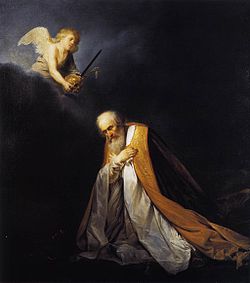David
| David | |
|---|---|
| King of Israel | |

Statue of King David by Nicolas Cordier in the Borghese Chapel of the Basilica di Santa Maria Maggiore
|
|
| Reign | c. 1010 – 1002 BCE (Judah only) c. 1002 – 970 BCE (Israel) |
| Predecessor |
Saul Ish-bosheth |
| Successor | Solomon |
| Born | c. 1040 BCE Bethlehem, Judah, Israel |
| Died | c. 970 BCE (aged 69 or 70) Jerusalem, Judah, Israel |
| Burial | City of David |
| Consort |
Michal Ahinoam Abigail Maachah Haggith Abital Eglah Bathsheba |
| Issue |
Amnon Chileab Absalom Adonijah Shephatiah Ithream Shammua Shobab Nathan Solomon Ibhar Elishua Nepheg Japhia Elishama Eliada Eliphalet Tamar |
| House | House of David |
| Father | Jesse |
| Mother | Nitzevet (Talmud) |
| King David the Prophet | |
|---|---|

King David in Prayer, by Pieter de Grebber (c. 1640)
|
|
| Holy Monarch, Prophet, Reformer, Spiritual Poet & Musician, Vicegerent of God, Psalm-Receiver | |
| Born | c. 1040 BCE Bethlehem |
| Died | c. 970 BCE Jerusalem |
| Venerated in |
Judaism Christianity Islam |
| Feast | December 29 – Roman Catholicism |
| Attributes | Psalms, Harp, Head of Goliath |
David (/ˈdeɪvɪd/; Hebrew: דָּוִד, Modern David, Tiberian Dāwîḏ; ISO 259-3 Dawid; Ancient Greek: Δαυίδ; Latin: Davidus, David) was, according to the Hebrew Bible, the second king of the United Kingdom of Israel and Judah, reigning in c. 1010–970 BCE.
Depicted as a valorous warrior of great renown, a poet, and musician credited for composing many of the psalms contained in the Book of Psalms, King David is viewed in biblical sources as a righteous and effective king both in battle and in providing civil and criminal justice. He is described as a man after God's own heart in 1 Samuel 13:14 and Acts 13:22.
The Hebrew prophets regarded him as the ancestor of the future messiah. According to the New Testament, he was an ancestor of Jesus.
...
Wikipedia
